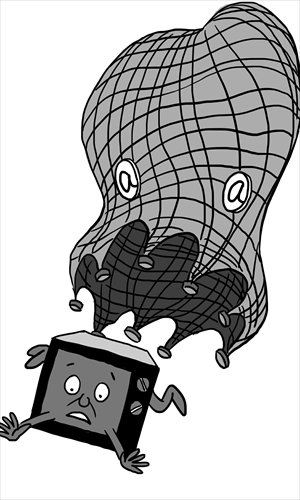TV drains us of ability to make our own decisions

TV once revolutionized the way we took in the world. It is instant, informative and intuitive. TV has successfully reached millions of homes, and is favored by people from all walks of life.
But today, the information provided by TV seems neither up to the minute, nor comprehensive. TV reaches into millions of homes, but its scope is far more limited than is claimed.
In fact, the very popularity of TV derives mostly from the inertia of those people who passively accept the transmission of information. This is a good enough reason for the elite to boycott TV.
Boycotting the TV does not mean we should smash all the actual TV sets. That is too crude even for philistines like myself. It means searching for a successful replacement for TV in order to break through the blockage of free information around us.
The public at present can only passively accept, instead of actively resist, the information that the television imposes on them. This reality gives the media authorities a virtual monopoly on power.
In this regard, TV differs little from the more "traditional" forms of media, such as newspaper, magazines and municipal bulletin boards.
On the other hand, the appearance of the Internet has delighted us with truly revolutionary transformations.
The advantages of the Internet as a medium are not merely limited to the information explosion. It is also in the interactivity of the users where the Internet demonstrates its superiority. Everyone can update their status and express their opinions.
In this public space, various social forces combat, blend, and balance each other. Everyone should welcome the idea of open debate in order to learn and be enlightened from the process.
Only through debate can we come to an awareness of universal values and morality. It is also only through continuous debate on the Internet that we can put one-sided publicity in check. What the show-business of television lacks can be provided by a liberated Internet environment, the moving force to build a better future. People should be able to make the right choice between passive indoctrination and active participation.
After all, the fetishization of TV is no different from the fetishization of monarchical power. To be sure, we may treat the TV like theater, merely as a distraction or a tool to appreciate art. However, once TV controls the sources of our information, it becomes dangerous.
I believe this is also why some people, me included, don't like the triple-play services, or the integration of broadband, TV and telecommunication networks. If, say, the Internet faced as many policy limitations as TV, would you not find this a worrisome prospect?
Although in many Chinese homes, the TV is put at the center of the living room, it is not the center of family life anymore, especially for the younger generation.
Many young couples in cities, after returning home from work, play with their laptops until they go to bed. They have more channels to watch new films and soap operas, to access the news, and to participate in public debate. The TV becomes a mere display device.
Older generations still have an attachment to TV. But it's sure that TV could never return to its golden age. It can't make you think deeply, but just keeps indoctrinating. The poor quality of many TV programs also disappoints people. The news is all the same, while entertainment shows just chase ratings.
It's time to bid farewell to TV, and embrace a life with more choices.
The author is a former college teacher and currently a senior executive with Ford in Nanjing. opinion@globaltimes.com.cn
Counterpoint: Broadcast advantages still strong in Internet age